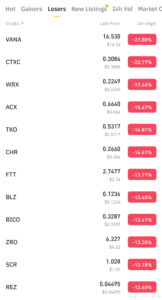EU to Lead the Metaverse Revolution and Take on Big Tech
The European Union (EU) intends to establish itself as a leader in the emerging field of metaverse development. The European Union is worried about the potential dominance of Big Tech and the implications it may have for smaller competitors in light of investments in metaverse products and services by companies like Facebook’s Meta Platforms, Microsoft, and Apple. The European Commission has unveiled a bold plan to address this issue, with the goal of fostering a metaverse that is open and interoperable and that is reflective of EU values and fundamental rights.
The goal of this initiative from the European Commission is to establish a safe and welcoming online space where all users can exercise their rights and freedoms in accordance with EU law. The commission predicts that by 2030, the global metaverse market will be worth over 800 billion euros, up from 27 billion euros in 2018. The European Union (EU) intends to capitalize on this expansion by coordinating the efforts of creators, media companies, and other interested parties to build a sustainable industrial ecosystem.
Margrethe Vestager, vice president of the European Commission, emphasized the need to prioritize people and uphold EU values in the development of the metaverse. To paraphrase what she said: “We want to make sure Web 4.0 becomes an open, secure, trustworthy, fair, and inclusive digital environment for all.” While tapping into the economic potential of the metaverse, the EU plans to mitigate risks related to privacy and disinformation.
The European Union’s plan is to establish a fully functional industrial ecosystem in the metaverse. The European Union (EU) hopes to promote innovation and guarantee a level playing field by bringing together creators, media companies, and other stakeholders. The goal of this strategy is to ensure that no single tech giant can dominate the metaverse to the detriment of smaller players.
The European Union (EU) wants to set up regulatory sandboxes in addition to encouraging cooperation. In order to promote innovation and ensure compliance with EU regulations, these “sandboxes” will provide a safe space for businesses to try out cutting-edge metaverse technologies and services. The European Union (EU) seeks to encourage the creation of novel and user-focused metaverse experiences by providing a safe environment in which to test them.
The EU plans to invest in programs that help people acquire new skills in preparation for the metaverse’s revolutionary potential. Individuals who complete these courses will be better prepared to enter and succeed in the metaverse economy. The European Union (EU) is investing heavily in education and training to equip its citizens with the tools they need to fully realize the potential of the metaverse.
The European Union also has plans to use the metaverse to improve public services. Online government services have the potential to reduce red tape, broaden participation, and save money. The European Union plans to investigate all of the potential applications of the metaverse, from telemedicine to interactive classrooms.
While there are no announced plans for metaverse regulation in the European Union at this time, the bloc’s existing regulations in areas like privacy, market power, and artificial intelligence will likely extend to the new sector. Margrethe Vestager, vice president of the European Commission, emphasized that the regulations enacted in recent years will apply to the metaverse. This method ensures that the metaverse is governed in a way that protects user rights and encourages healthy competition.
The European Union’s regulatory push is part of a larger strategy to counteract Big Tech’s hegemony. The European Union (EU) is working to ensure that all players, no matter how big or small, have a level playing field in the metaverse by applying existing regulations to it.
As the metaverse develops and gains traction, the European Union is committed to becoming a dominant player in the field. The European Union (EU) has an ambitious plan to shape the metaverse in accordance with EU values and stop Big Tech from taking over. The European Union (EU) aspires to create a metaverse that is open, secure, and inclusive for all by encouraging collaboration, establishing regulatory sandboxes, investing in skill development, and exploring virtual public services.
While there is currently no set framework for governing the metaverse, it is likely that existing regulations will be extended to this new digital realm. The EU is serious about fostering innovation in the metaverse, so it’s taking the initiative to make sure everyone is playing on a level playing field. The EU’s foresight and initiatives could transform the metaverse into a place that protects users’ rights and privacy while encouraging economic growth, innovation, and social progress.
First reported on Reuters
Frequently Asked Questions
Q: What is the metaverse?
A: The metaverse refers to a virtual reality space where users can interact with a computer-generated environment and other users in real-time. It encompasses a range of digital experiences, including virtual worlds, augmented reality, and mixed reality.
Q: Why is the European Union (EU) concerned about Big Tech’s involvement in the metaverse?
A: The EU is concerned about the potential dominance of Big Tech companies, such as Facebook’s Meta Platforms, Microsoft, and Apple, in the metaverse. They aim to prevent these companies from monopolizing the metaverse market and stifling competition, which could have implications for smaller players and the overall openness and inclusivity of the metaverse.
Q: What is the European Commission’s plan for the metaverse?
A: The European Commission plans to foster an open and interoperable metaverse that aligns with EU values and fundamental rights. They aim to coordinate the efforts of creators, media companies, and other stakeholders to build a sustainable industrial ecosystem. The EU also plans to establish regulatory sandboxes, invest in education and training, and explore the use of the metaverse in improving public services.
Q: How does the EU plan to address privacy and disinformation risks in the metaverse?
A: While tapping into the economic potential of the metaverse, the EU plans to mitigate risks related to privacy and disinformation. They aim to establish a safe and trustworthy digital environment by enforcing existing regulations and extending them to the metaverse. This ensures user rights are protected and healthy competition is encouraged.
Q: How will the EU ensure a level playing field in the metaverse?
A: The EU intends to promote innovation and guarantee a level playing field by bringing together creators, media companies, and other stakeholders. They will establish regulatory sandboxes to provide a safe space for businesses to test metaverse technologies. Existing regulations in areas like privacy, market power, and artificial intelligence will likely apply to the metaverse to ensure fair competition.
Featured image credit: Unsplash
Source link
#Lead #Metaverse #Revolution #Big #Tech





